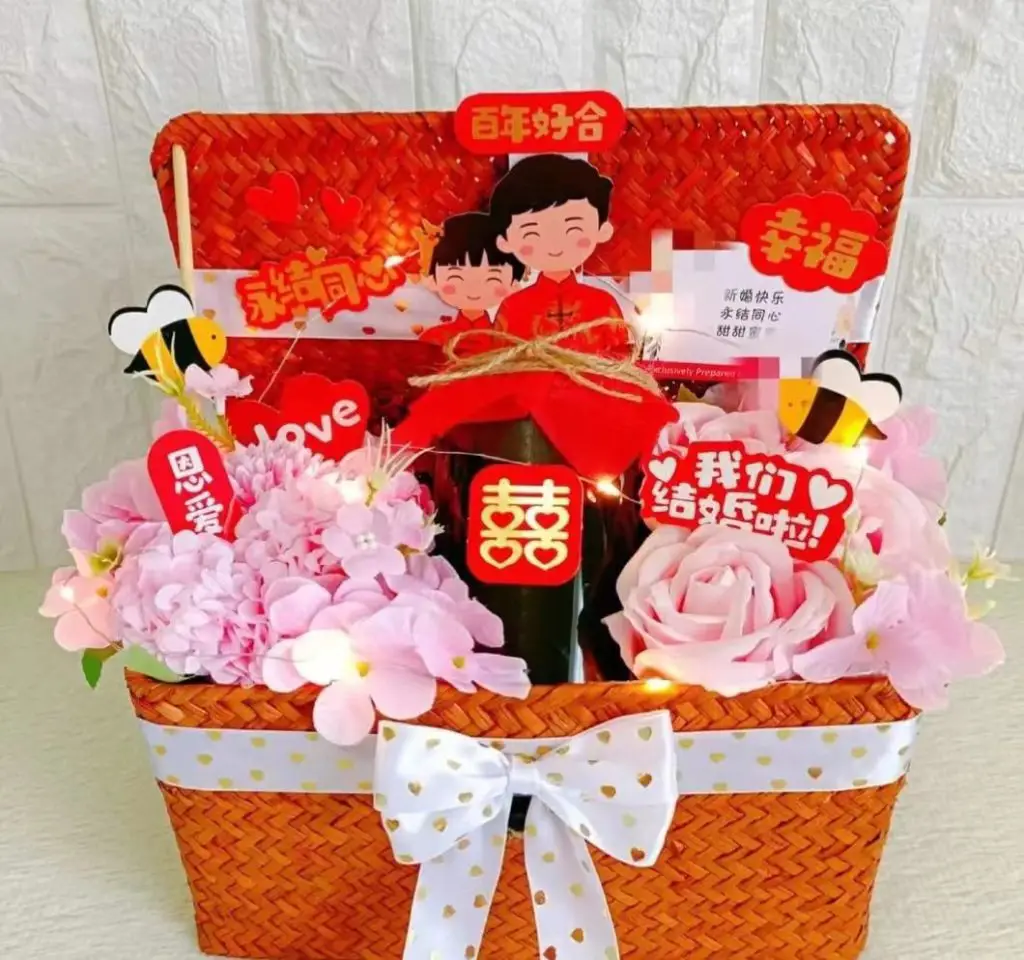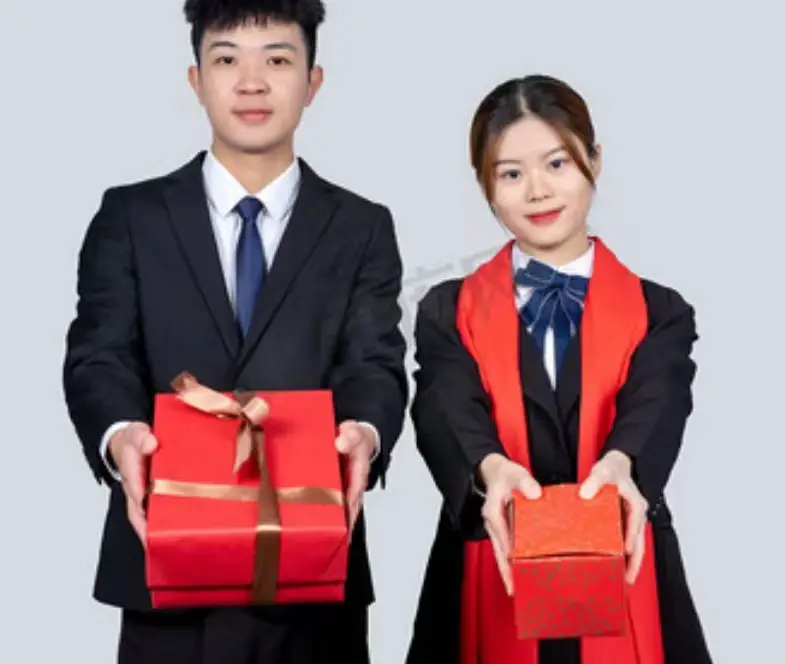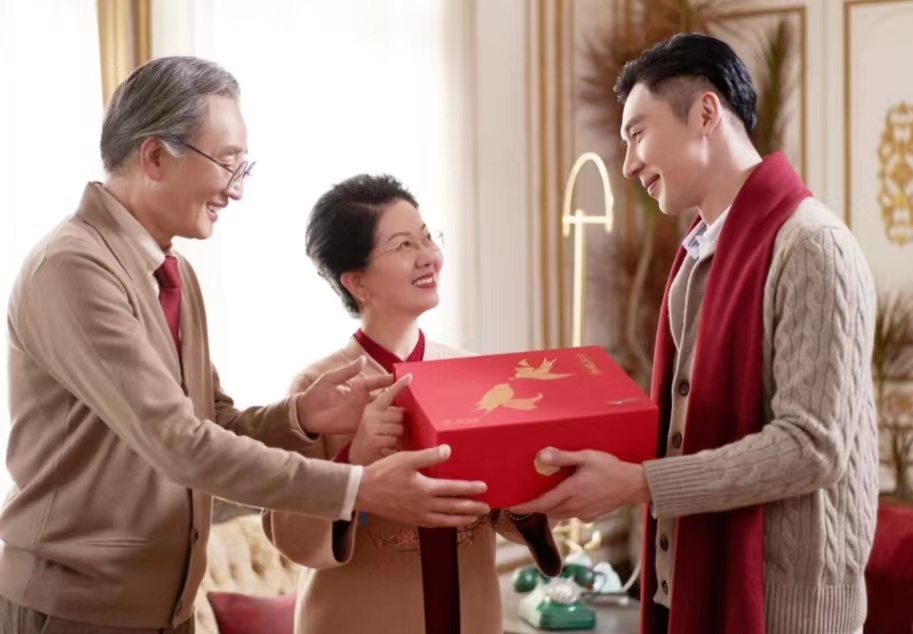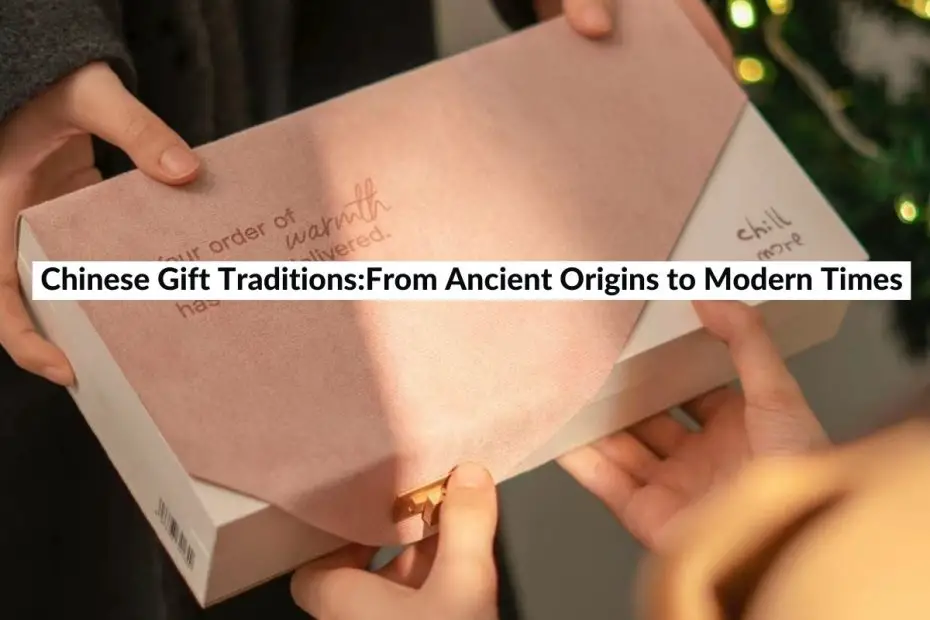In Chinese culture, the act of giving gifts holds great significance. It is a gesture that symbolizes respect, gratitude, and good wishes. Whether you are visiting China or interacting with Chinese individuals, understanding the customs and etiquette associated with gift-giving is essential.
In this article, we will explore various aspects of giving gifts in Chinese culture, including the meaning of gifts, appropriate occasions for giving, and the do’s and don’ts of gift-giving.
So, let’s dive in!
In Chinese, the word for "gift" is 礼物 (lǐwù)🎁When Chinese Gift is Given?
In Chinese culture, gifts are given on various occasions to express goodwill and build stronger relationships. Some common occasions for giving gifts in China include:
| Occasion | Description |
|---|---|
| Festivals and Holidays | Chinese New Year, Mid-Autumn Festival, Dragon Boat Festival, etc. |
| Birthdays and Anniversaries | Celebrations of personal milestones and achievements |
| Weddings | Giving gifts to the newlyweds to bless their union |
| Business Relationships | Exchanging gifts with business partners to foster goodwill and trust. Best Gift Ideas For Chinese Boss. |
| Housewarming | Presenting gifts when someone moves into a new home |
| Visiting Friends and Relatives | Bringing gifts when visiting someone’s home as a gesture of respect and gratitude. Chinese appreciate some foreign gifts from the US or else where in the world. I wrote a list of gift ideas here. |
| Thank You Gifts | Showing appreciation for someone’s help or hospitality |
| Valentine’s Day | Exchanging romantic gifts with loved ones. Especially Chinese Girls care about this one very much. Don’t panic, I got your covered! (Check the gift guide.) |
| Graduation | Congratulating and gifting a graduate for their academic achievements |
| New Baby | Welcoming a new addition to the family with baby gifts |
| Retirement | Celebrating someone’s retirement with thoughtful gifts and well wishes |
| Get Well Soon | Offering gifts to uplift and bring comfort to someone recovering from an illness |
| Promotion | Commemorating a career milestone with gifts and recognition |
Chinese Gift Taboos-The Dos and Don’ts of Gift Giving in Chinese Culture
Do’s:
| No. | Gift | Cultural Significance | Explanation |
|---|---|---|---|
| 1 | Home Specialties | Gifts from your home country or regions | These gifts showcase your culture and provide a unique experience, as they cannot be easily purchased in China. |
| 2 | Local Wine & Cigars | Wine, cigars, or cigarette lighter from China | Sharing local beverages or tobacco products allows for cultural exchange and demonstrates thoughtfulness towards the recipient. |
| 3 | Kitchen Gadgets | Cooking pots, frying pans, ceramic plates | Practical kitchen items are highly valued and can enhance the recipient’s culinary experience. |
| 4 | Exotic Coffee | Branded overseas coffee powder or beans | Offering exotic coffee introduces new flavors and indulges the recipient’s taste for luxury and sophistication. |
| 5 | Tea | Nicely wrapped box of flower tea or fruit tea | Tea is deeply rooted in Chinese culture, and a well-presented box of high-quality tea shows respect and attention to detail. The best teapot will be a great chocie. Check the Yixing teapot guide here! |
| 6 | Engraved Pens | Practical gift, avoid pens with red ink | Engraved pens are not only functional but also demonstrate personalization and thoughtfulness. |
| 7 | A Banquet | Reciprocating a Chinese business protocol | Hosting a banquet for the recipient reciprocates their hospitality and strengthens the business relationship. |
| 8 | Clothes | Hat, gloves, scarf, or clothes | Clothing gifts show care and consideration, especially for the elderly members of the recipient’s family. |
| 9 | Comb or Foot Bath Massager | High-quality comb or foot bath massager | Traditional Chinese medicine values health and well-being, and these gifts promote relaxation and self-care. |
| 10 | School Supplies | Writing pen, notebook, painting brushes, enlightening books | Providing school supplies fosters education and shows support for the recipient’s academic endeavors. |
| 11 | Toys | Good-quality toys for children, chess set for teenager | Toys encourage creativity, learning, and joy for children, while chess sets promote strategic thinking and mental stimulation. |
| 12 | Red Packets | Cash-filled red packets for birthdays and special occasions | Red packets symbolize good fortune and blessings when given during celebrations, enhancing the festive atmosphere. |
| 13 | Vitamins and Health Supplements | Traditional medicines and health supplements | Health-consciousness is prominent in Chinese culture, and these gifts demonstrate care for the recipient’s well-being. |
| 14 | Male Hi-end Supplements | American ginseng, herbal teas, high-quality multivitamin | Traditional herbal remedies and high-quality supplements are highly regarded for their potential health benefits. |
| 15 | Food/Fruit Baskets | Packed with delicious and exotic fruits | Food and fruit baskets are versatile gifts suitable for various occasions, representing abundance, joy, and good wishes. |
| 16 | Home Supplies | Electrical equipment for new house owners | Assisting with home supplies showcases practicality and helps the recipient settle into their new home comfortably. |
| 17 | Perfume and Lotions | Fragrances and lotions from good brands | Perfume and lotions are luxurious gifts that allow the recipient to indulge in self-care and enhance their personal grooming. |
The explanations provided highlight the cultural significance and reasons behind considering each gift. By understanding the context and cultural values associated with these gifts, individuals can make informed choices to express their goodwill and respect when interacting with Chinese individuals or families.
Don’ts:

| No. | Gift | Cultural Significance |
|---|---|---|
| 1 | Sharp Objects | Giving sharp objects suggests wanting to sever a friendship/relationship |
| 2 | The Number 4 | Number four sounds like “death” in Chinese culture, associated with bad luck |
| 3 | Shoes | “Shoes” sounds like “evil” in Chinese, symbolizing running away or bad luck |
| 4 | Handkerchiefs | Giving a handkerchief sounds like farewell or breakup in Chinese culture |
| 5 | Clocks | “Giving a clock” sounds like the phrase for completing burial rites, associated with death |
| 6 | Pears | “Pears” sounds like “parting” in Chinese, symbolizing bad luck or separation |
| 7 | Chrysanthemum Cut Flowers | Cut flowers, especially chrysanthemums and white/yellow flowers, are associated with funerals |
| 8 | Umbrellas | “Umbrella” sounds like “breaking up” in Chinese, symbolizing relationship dissolution |
| 9 | Black or White Objects | Black and white are associated with funerals, better to avoid as gifts |
| 10 | Mirrors | Mirrors are believed to attract ghosts and symbolize bad omens when broken |
| 11 | Green Hats | Green hats symbolize infidelity in relationships |
| 12 | Necklaces, Comb | Necklaces, combs, and intimate items are better suited for romantic relationships |
| 13 | Ornamental Stones with Unknown Source | Stones and antiques are believed to attract evil spirits |
| 14 | Candles | Candles are used for honoring the deceased, not suitable as gifts |
| 15 | Dolls | Dolls may be associated with evil or negative energies in some beliefs |
This table summarizes various gifts and their cultural significances in Chinese culture. It provides insights into the symbolic meanings attached to these gifts and the reasons why they are considered inappropriate or unlucky.
By understanding these cultural nuances, one can navigate gift-giving in China more effectively and avoid inadvertently causing offense. It’s important to keep in mind that while some gifts are discouraged, there are still plenty of good options available for gifting in Chinese culture.
Chinese Etiquette on Gift Giving and Receiving
In Chinese culture, the act of giving and receiving gifts is considered a significant ritual. Here are some essential etiquette tips to remember:
Gift Giving Etiquette in Chinese Culture
| Etiquette | Explanation |
|---|---|
| Use Both Hands | When presenting or receiving a gift, use both hands as a sign of respect and sincerity. |
| Insist on Gift Exchange | The recipient may decline the gift several times out of politeness. The giver should insist and push gently until the offer is accepted. |
| Express Gratitude | Always express gratitude to the recipient for accepting the gift. |
| Do Not Accept the Gift Immediately | As a foreigner, it is customary to decline a gift on the first presentation. Wait until it is insisted upon multiple times before accepting. |
| Unwrap the Gift Privately | It is generally not customary to unwrap gifts in the presence of the giver, unless insisted upon. |
| Reciprocate with Similar Value | Among friends, reciprocate with gifts of similar value. However, do not expect the same from customers or elders. |
| Seek an Intermediary for Important Figures | When offering a gift to someone of higher authority, consider involving an intermediary who knows the recipient well. |
| Interpret Acceptance or Rejection of In-laws’ Gift | If your to-be-parents-in-law accept the gift, it indicates a positive sign for the relationship. |
| Timing of Gift Presentation | Among friends and family, gifts are presented at the beginning of a meeting or before a meal. For organizational gifts, present them during a toast or before departure. |
| Framed Painting for Long-standing Relationships | A framed painting depicting your country’s scenery is considered a thoughtful gift for companies with a longstanding relationship. |
| Price Tags and Receipts | Unlike in the West, it is acceptable to leave price tags and receipts in the bags if the gift is expensive. |
| Avoid Gifting Bereaved Families | It is considered unlucky to visit or gift bereaved families within a month of the funeral. |
| Symbolic Meaning of Numbers | The number eight is seen as lucky, while the number six symbolizes blessings and smooth progress. |
| Keep Records for Reciprocation | Maintain records of received gifts or money to reciprocate with similar value later. |
| Greeting Cards Not Common | Greeting cards are rarely used in China, so it is not necessary to include one with the gift. |
| Be Cautious of Gift Giving in Business Context | Official policy in Chinese business culture discourages gift giving as it can be seen as bribery. Be careful with lavish gifts. |
| Maintain Privacy in Honoring Individuals | If honoring an individual in a business context, do so discreetly to avoid embarrassment or possible problems. |
| Avoid Taking Photographs of Gift Giving | Unless it is a symbolic gift presented to an organization, refrain from taking photographs of gift giving. |
Gift Receiving Etiquette in Chinese Culture
| Etiquette | Explanation |
|---|---|
| Use Both Hands | When receiving a gift, use both hands as a sign of respect and appreciation. |
| Politely Decline the Gift | As the recipient, it is customary to decline a gift initially as a gesture of politeness. |
| Accept After Multiple Offers | If the giver insists multiple times, it is acceptable to accept the gift graciously. |
| Express Gratitude | Show gratitude and appreciation to the giver for their thoughtful gesture. |
| Open Gifts Privately | It is common to open gifts after leaving the presence of the giver, unless insisted upon otherwise. |
Chinese Gift Guide for Different Occasions
1. Chinese Gifts to Give in Chinese New Year
Chinese New Year is the most important traditional festival in China. When giving gifts during this auspicious time, it is customary to give red envelopes (hongbao) containing money to children and unmarried individuals. Other popular gifts include oranges (symbolizing luck) and various traditional snacks and treats.
2. Chinese Gifts on Birthdays & Traditional Chinese Birthday Gifts
Birthdays are celebrated with enthusiasm in Chinese culture. When selecting gifts for birthdays, consider items such as longevity noodles (symbolizing a long and prosperous life), red date cakes, and special birthday soups.
3. Gifts for Chinese Weddings

Chinese weddings are joyous occasions filled with customs and traditions. Common gifts include red envelopes with money, tea sets, bedding items, and household appliances. These gifts are meant to bless the newlyweds with happiness, prosperity, and a harmonious marriage.
4. Gifts When Returning From Travel
When someone returns from a trip, it is customary to bring back souvenirs or gifts for family, friends, and colleagues. Popular choices include local delicacies, keychains, small decorative items, or handicrafts that represent the visited destination.
Speaking of decorations, if you are a fan of Chinese wall decor, you do not want to miss these ideas.💗
5. Chinese Gifts for Housewarming(New Home)
When attending a housewarming party, it is thoughtful to bring practical gifts for the new homeowners. Some suitable gifts include potted plants, tea sets, home appliances, or decorative items that symbolize good luck and prosperity.
6. Chinese Gifts for Good Luck
Chinese culture places great emphasis on luck and auspicious symbols. When selecting gifts for good luck, consider items such as lucky bamboo, Feng Shui ornaments, Chinese zodiac-themed products, or items featuring the character “Fu” (福) meaning fortune or luck.
7. Traditional Chinese Thank You Gifts
When expressing gratitude in Chinese culture, it is common to present thank you gifts as a token of appreciation. Traditional Chinese thank you gifts can include items like tea sets, calligraphy brushes, Chinese tea, or personalized items that hold special meaning to the recipient.
8. Chinese Valentine’s Day Gifts
Chinese Valentine’s Day, also known as Qixi Festival or Double Seventh Festival, is a day for expressing love and romance. Popular gifts for this occasion include flowers (especially red roses), chocolates, jewelry, and personalized love tokens.
9. Gifts for New Business

When it comes to giving gifts to new businesses or entrepreneurs in China, there are certain considerations to keep in mind. Items like calendars, flower pots with nice cacti, portraits, inspiring quotes, or red packets can be great choices.
In Chinese business culture, the following guidelines are accepted:
- Conclude all business negotiations before exchanging gifts.
- Clearly indicate that the gift is from the company you represent and explain the rationale behind it.
- Ensure that the gifts are presented to the negotiation team leader.
- Avoid presenting overly expensive gifts to prevent the company from feeling obligated to reciprocate extensively.
- Make sure that gifts given to staff members of equal rank are of the same value. Any disparities may be taken as a sign of unfair treatment.
By following these guidelines, you can show your appreciation to new businesses and entrepreneurs in China while respecting their cultural norms and fostering positive relationships.
10. Chinese Gifts for Good Health
In Chinese culture, there are several traditional gifts that are commonly associated with promoting good health. These include herbal teas and tonics made from natural ingredients known for their health benefits. Ginseng, goji berries, and other medicinal herbs are often given as gifts to improve vitality and well-being.
Feng shui items such as lucky charms, healing crystals, and indoor plants are also believed to bring positive energy and good health. Traditional Chinese medicine books or guides can be thoughtful gifts for those interested in holistic health practices.
Additionally, red envelopes filled with money are sometimes given to symbolize good fortune and prosperity, which is believed to contribute to overall health and well-being.
Chinese Gift Guide for Different People
1. Giving Chinese Gifts to Chinese Business Associates
When giving gifts to Chinese business associates, it is crucial to choose appropriate items that reflect professionalism and goodwill. Some suitable gifts include high-quality pens, business card holders, luxury notebooks, or items that represent your home country.
2. Gifts for Chinese Family Members and Seniors
When selecting gifts for Chinese family members or seniors, it is important to consider their preferences and interests. Some thoughtful options include health supplements, tea sets, photo frames with family pictures, or customized items with family names or symbols.
3. Gifts for a Chinese Friend
When giving gifts to a Chinese friend, consider their hobbies, interests, or personal preferences. Popular choices can range from books, music albums, fashion accessories, or items that reflect shared memories or experiences.
4. Gifts to Give When Visiting Chinese In-laws (Father-in-laws & Mother-in-laws)

Visiting Chinese in-laws is an important occasion that requires respectful and thoughtful gifts. Consider items like health tonics, tea sets, traditional Chinese paintings, or personalized gifts that show gratitude and respect for the parents.
5. Gifts for Hospitalized/Sick Chinese
When visiting someone who is hospitalized or sick, it is important to choose gifts that convey wishes for a speedy recovery and good health. Suitable gifts can include fruit baskets, healthy snacks, comfortable clothing, or items that provide entertainment or relaxation.
6. Good Gift for a Chinese Woman
When selecting a gift for a Chinese woman, consider items that emphasize beauty, elegance, and personal care. Popular choices include cosmetics, skincare products, jewelry, silk scarves, or fashionable accessories.
7. Gift for a Chinese Man
When choosing a gift for a Chinese man, consider practical and functional items that align with his interests and lifestyle. Some suitable options include high-quality pens, electronic gadgets, sports equipment, or accessories related to his hobbies.
8. Chinese Gifts for New Baby
In Chinese culture, traditional gifts for a new baby include red packets (hongbao) filled with money, gold or silver jewelry for good luck, traditional baby clothing, Chinese zodiac-themed items, and practical baby care products. Books and educational toys are also appreciated for early learning.
Personalized keepsake items such as engraved photo frames or memory boxes are thoughtful gifts. When presenting these gifts, it is customary to use both hands and include a congratulatory message for the baby’s well-being.
Conclusion
In Chinese culture, gift-giving is a meaningful gesture that reflects respect, gratitude, and good wishes. By understanding the customs and etiquette associated with gift-giving, you can navigate social interactions in Chinese culture with grace and sensitivity.
Remember to choose gifts thoughtfully, present them with both hands, and express sincere appreciation. Whether it’s for Chinese New Year, birthdays, weddings, or other occasions, the right gift can strengthen relationships and create lasting memories. ✌✌✌
FAQs:
Is it appropriate to give money as a gift in Chinese culture?
Yes, giving money as a gift is a common practice in Chinese culture, particularly during special occasions like weddings, Chinese New Year, or birthdays. It is believed to bring good luck and blessings to the recipient. The money is usually presented in a red envelope, known as a “hongbao” or “lai see,” which signifies good fortune and prosperity.
What is the significance of the color red in Chinese gift-giving?
The color red holds great significance in Chinese culture and is often associated with luck, happiness, and celebration. In the context of gift-giving, red is considered an auspicious color that symbolizes good fortune and wards off evil spirits.
Red envelopes (hongbao) are commonly used to present monetary gifts during festivals and special occasions. The color red is also frequently used for gift wrappings and decorations to bring joy and blessings to the recipient.
What are the gift traditions in the past of China?
- Red envelopes (Hongbao) containing money were given during special occasions as a symbol of good luck and prosperity.
- Lucky bamboo, believed to bring good fortune, was a popular gift for its auspicious symbolism.
- Zodiac animal-themed gifts personalized to the recipient’s birth year held special meaning and were cherished.
- Traditional tea sets, Chinese knots, and festive foods were also commonly exchanged, representing hospitality, blessings, and cultural traditions.


